formerly eScholarship Editions


|
|
|
|
Your search for
'History' in subject
found 514 book(s). | Modify Search | Displaying 441 - 460 of 514 book(s) | |
| 441. | 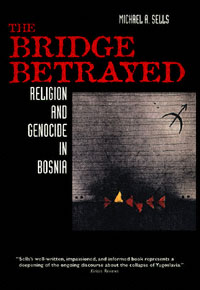 | Title: The bridge betrayed: religion and genocide in Bosnia Author: Sells, Michael Anthony Published: University of California Press, 1996 Subjects: Religion | Politics | European History | Islam | History | Middle Eastern Studies | Jewish Studies | Christianity Publisher's Description: The recent atrocities in Bosnia-Herzegovina have stunned people throughout the world. With Holocaust memories still painfully vivid, a question haunts us: how is this savagery possible? Michael A. Sells answers by demonstrating that the Bosnian conflict is not simply a civil war or a feud of age-old adversaries. It is, he says, a systematic campaign of genocide and a Christian holy war spurred by religious mythologies.This passionate yet reasoned book examines how religious stereotyping - in popular and official discourse - has fueled Serbian and Croatian ethnic hatreds. Sells, who is himself Serbian American, traces the cultural logic of genocide to the manipulation by Serb nationalists of the symbolism of Christ's death, in which Muslims are "Christ-killers" and Judases who must be mercilessly destroyed. He shows how "Christoslavic" religious nationalism became a central part of Croat and Serbian politics, pointing out that intellectuals and clergy were key instruments in assimilating extreme religious and political ideas.Sells also elucidates the ways that Western policy makers have rewarded the perpetrators of the genocide and punished the victims. He concludes with a discussion of how the multireligious nature of Bosnian society has been a bridge between Christendom and Islam, symbolized by the now-destroyed bridge at Mostar. Drawing on historical documents, unpublished United Nations reports, articles from Serbian and Bosnian media, personal contacts in the region, and Internet postings, Sells reveals the central role played by religious mythology in the Bosnian tragedy. In addition, he makes clear how much is at stake for the entire world in the struggle to preserve Bosnia's existence as a multireligious society. [brief] Similar Items |
| 442. | 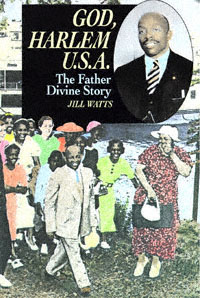 | Title: God, Harlem U.S.A.: the Father Divine story Author: Watts, Jill Published: University of California Press, 1992 Subjects: History | United States History | Christianity | American Studies | African American Studies | African Studies Publisher's Description: How did an African-American man born in a ghetto in 1879 rise to such religious prominence that his followers addressed letters to him simply "God, Harlem U.S.A."?Using hitherto unknown materials, Jill Watts portrays the life and career of one of the twentieth century's most intriguing religious leaders, Father Divine. Starting as an itinerant preacher, Father Divine built an unprecedented movement that by the 1930s had attracted followers across the nation and around the world. As his ministry grew, so did the controversy surrounding his enormous wealth, flamboyant style, and committed "angels" - black and white, rich and poor alike.Here for the first time a full account of Father Divine's childhood and early years challenges previous contentions that he was born into a sharecropping family in the deep South. While earlier biographers have concentrated on Father Divine's social and economic programs, Watts focuses on his theology, which gives new meaning to secular activities that often appeared contradictory. Although much has been written about Father Divine, God, Harlem U.S.A . finally provides a balanced and intimate account of his life's work. [brief] Similar Items |
| 443. | 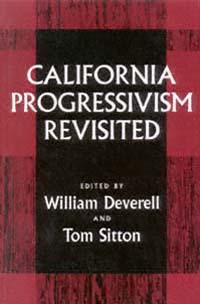 | Title: California progressivism revisited Author: Deverell, William Francis Published: University of California Press, 1994 Subjects: History | Politics | United States History | Californian and Western History | California and the West Publisher's Description: California was perhaps the most important locus for the development of the Progressive reform movement in the decades of the twentieth century. These twelve original essays represent the best of the new scholarship on California Progressivism. Ranging across a spectrum that embraces ethnicity, gender, class, and varying ideological stances, the authors demonstrate that reform in California was a far broader, more complicated phenomenon than we have previously understood.Since the 1950s, scholars have used California Progressivism as a model case study for explaining early twentieth-century social and political reform nationwide. But such a model - which ignored issues of class, race, and gender - simplified a political movement that was, in fact, quite complex.In revising the monolithic interpretation of reform and reformers, this volume provides a better understanding of the sweeping reform impulses that had such a profound effect on American political and social institutions during this century. Equally important, the issues examined here offer significant insights into problems that the entire country must tackle as we approach the new century. [brief] Similar Items |
| 444. |  | Title: The culture of sectarianism: community, history, and violence in nineteenth-century Ottoman Lebanon Author: Makdisi, Ussama Samir 1968- Published: University of California Press, 2000 Subjects: History | Middle Eastern History | Middle Eastern Studies | Postcolonial Studies | Islam | Cultural Anthropology Publisher's Description: Focusing on Ottoman Lebanon, Ussama Makdisi shows how sectarianism was a manifestation of modernity that transcended the physical boundaries of a particular country. His study challenges those who have viewed sectarian violence as an Islamic response to westernization or simply as a product of social and economic inequities among religious groups. The religious violence of the nineteenth century, which culminated in sectarian mobilizations and massacres in 1860, was a complex, multilayered, subaltern expression of modernization, he says, not a primordial reaction to it. Makdisi argues that sectarianism represented a deliberate mobilization of religious identities for political and social purposes. The Ottoman reform movement launched in 1839 and the growing European presence in the Middle East contributed to the disintegration of the traditional Lebanese social order based on a hierarchy that bridged religious differences. Makdisi highlights how European colonialism and Orientalism, with their emphasis on Christian salvation and Islamic despotism, and Ottoman and local nationalisms each created and used narratives of sectarianism as foils to their own visions of modernity and to their own projects of colonial, imperial, and national development. Makdisi's book is important to our understanding of Lebanese society today, but it also makes a significant contribution to the discussion of the importance of religious discourse in the formation and dissolution of social and national identities in the modern world. [brief] Similar Items |
| 445. | 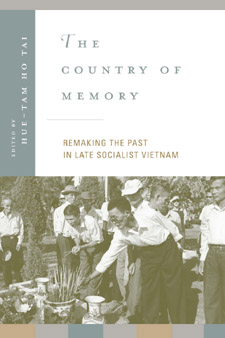 | Title: The country of memory: remaking the past in late socialist Vietnam Author: Tai, Hue-Tam Ho 1948- Published: University of California Press, 2001 Subjects: History | Southeast Asia | Film | Gender Studies | Postcolonial Studies | Popular Culture | Asian History Publisher's Description: The American experience in the Vietnam War has been the subject of a vast body of scholarly work, yet surprisingly little has been written about how the war is remembered by Vietnamese themselves. The Country of Memory fills this gap in the literature by addressing the subject of history, memory, and commemoration of the Vietnam War in modern day Vietnam. This pathbreaking volume details the nuances, sources, and contradictions in both official and private memory of the War, providing a provocative assessment of social and cultural change in Vietnam since the 1980s. Inspired by the experiences of Vietnamese veterans, artists, authorities, and ordinary peasants, these essays examine a society undergoing a rapid and traumatic shift in politics and economic structure. Each chapter considers specific aspects of Vietnamese culture and society, such as art history, commemorative rituals and literature, gender, and tourism. The contributors call attention to not only the social milieu in which the work of memory takes place, but also the historical context in which different representations of the past are constructed. Drawing from a variety of sources, such as prison memoirs, commemorative shrines, funerary rituals, tourist sites and brochures, advertisements, and films, the authors piece together the disparate representations of the past in Vietnam. With these rare perspectives, The Country of Memory makes an important contribution to debates within postcolonial studies, as well as to the literature on memory, Vietnam, and the Vietnam War. [brief] Similar Items |
| 446. | 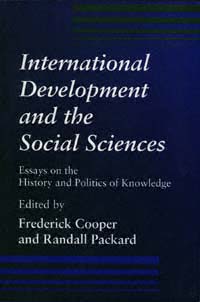 | Title: International development and the social sciences: essays on the history and politics of knowledge Author: Cooper, Frederick 1947- Published: University of California Press, 1998 Subjects: History | Social Science | Postcolonial Studies | Anthropology | Economics and Business | Politics Publisher's Description: During the past fifty years, colonial empires around the world have collapsed and vast areas that were once known as "colonies" have become known as "less developed countries" or "the third world." The idea of development - and the relationship it implies between industrialized, affluent nations and poor, emerging nations - has become the key to a new conceptual framework. Development has also become a vast industry, involving billions of dollars and a worldwide community of experts. These essays - written by scholars in many fields - examine the production, transmission, and implementation of ideas about development within historical, political, and intellectual contexts, emphasizing the changing meanings of development over the past fifty years.The concept of development has come under attack in recent years both from those who see development as the imperialism of knowledge, imposing on the world a modernity that it does not necessarily want, and those who see development efforts as a distortion of the world market. These essays look beyond the polemics and focus on the diverse, contested, and changing meanings of development among social movements, national governments, international agencies, foundations, and scholars. [brief] Similar Items |
| 447. | 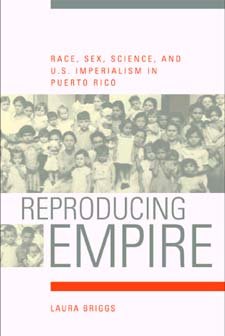 | Title: Reproducing empire: race, sex, science, and U.S. imperialism in Puerto Rico Author: Briggs, Laura 1964- Published: University of California Press, 2003 Subjects: History | Ethnic Studies | Medicine | United States History | Women's Studies | Gender Studies Publisher's Description: Original and compelling, Laura Briggs's Reproducing Empire shows how, for both Puerto Ricans and North Americans, ideologies of sexuality, reproduction, and gender have shaped relations between the island and the mainland. From science to public policy, the "culture of poverty" to overpopulation, feminism to Puerto Rican nationalism, this book uncovers the persistence of concerns about motherhood, prostitution, and family in shaping the beliefs and practices of virtually every player in the twentieth-century drama of Puerto Rican colonialism. In this way, it sheds light on the legacies haunting contemporary debates over globalization. Puerto Rico is a perfect lens through which to examine colonialism and globalization because for the past century it has been where the United States has expressed and fine-tuned its attitudes toward its own expansionism. Puerto Rico's history holds no simple lessons for present-day debate over globalization but does unearth some of its history. Reproducing Empire suggests that interventionist discourses of rescue, family, and sexuality fueled U.S. imperial projects and organized American colonialism. Through the politics, biology, and medicine of eugenics, prostitution, and birth control, the United States has justified its presence in the territory's politics and society. Briggs makes an innovative contribution to Puerto Rican and U.S. history, effectively arguing that gender has been crucial to the relationship between the United States and Puerto Rico, and more broadly, to U.S. expansion elsewhere. [brief] Similar Items |
| 448. | 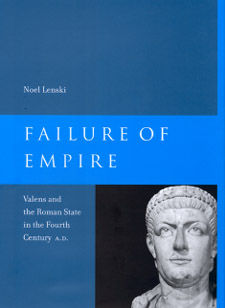 | Title: Failure of empire: Valens and the Roman state in the fourth century A.D Author: Lenski, Noel Emmanuel 1965- Published: University of California Press, 2003 Subjects: Classics | History | Classical History | Ancient History | Classical Politics | Autobiographies and Biographies Publisher's Description: Failure of Empire is the first comprehensive biography of the Roman emperor Valens and his troubled reign (a.d. 364-78). Valens will always be remembered for his spectacular defeat and death at the hands of the Goths in the Battle of Adrianople. This singular misfortune won him a front-row seat among history's great losers. By the time he was killed, his empire had been coming unglued for several years: the Goths had overrun the Balkans; Persians, Isaurians, and Saracens were threatening the east; the economy was in disarray; and pagans and Christians alike had been exiled, tortured, and executed in his religious persecutions. Valens had not, however, entirely failed in his job as emperor. He was an admirable administrator, a committed defender of the frontiers, and a ruler who showed remarkable sympathy for the needs of his subjects. In lively style and rich detail, Lenski incorporates a broad range of new material, from archaeology to Gothic and Armenian sources, in a study that illuminates the social, cultural, religious, economic, administrative, and military complexities of Valens's realm. Failure of Empire offers a nuanced reconsideration of Valens the man and shows both how he applied his strengths to meet the expectations of his world and how he ultimately failed in his efforts to match limited capacities to limitless demands. [brief] Similar Items |
| 449. | 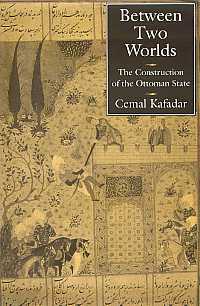 | Title: Between two worlds: the construction of the Ottoman state Author: Kafadar, Cemal 1954- Published: University of California Press, 1995 Subjects: History | Politics | Middle Eastern History | Middle Eastern Studies | Medieval History | Medieval Studies Publisher's Description: Cemal Kafadar offers a much more subtle and complex interpretation of the early Ottoman period than that provided by other historians. His careful analysis of medieval as well as modern historiography from the perspective of a cultural historian demonstrates how ethnic, tribal, linguistic, religious, and political affiliations were all at play in the struggle for power in Anatolia and the Balkans during the late Middle Ages.This highly original look at the rise of the Ottoman empire - the longest-lived political entity in human history - shows the transformation of a tiny frontier enterprise into a centralized imperial state that saw itself as both leader of the world's Muslims and heir to the Eastern Roman Empire. [brief] Similar Items |
| 450. | 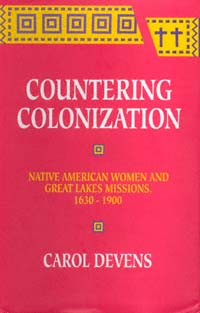 | Title: Countering colonization: Native American women and Great Lakes missions, 1630-1900 Author: Devens, Carol Published: University of California Press, 1992 Subjects: History | Native American Studies | American Studies | Native American Ethnicity | Women's Studies | Religion Publisher's Description: With Countering Colonization , Carol Devens offers a well-documented, revisionary history of Native American women. From the time of early Jesuit missionaries to the late nineteenth century, Devens brings Ojibwa, Cree, and Montagnais-Naskapi women of the Upper Great Lakes region to the fore. Far from being passive observers without regard for status and autonomy, these women were pivotal in their own communities and active in shaping the encounter between Native American and white civilizations.While women's voices have been silenced in most accounts, their actions preserved in missionary letters and reports indicate the vital part women played during centuries of conflict. In contrast to some Indian men who accepted the missionaries' religious and secular teachings as useful tools for dealing with whites, many Indian women felt a strong threat to their ways of life and beliefs. Women endured torture and hardship, and even torched missionaries' homes in an attempt to reassert control over their lives. Devens demonstrates that gender conflicts in Native American communities, which anthropologists considered to be "aboriginal," resulted in large part from women's and men's divergence over the acceptance of missionaries and their message.This book's perspective is unique in its focus on Native American women who acted to preserve their culture. In acknowledging these women as historically significant actors, Devens has written a work for every scholar and student seeking a more inclusive understanding of the North American past. [brief] Similar Items |
| 451. | 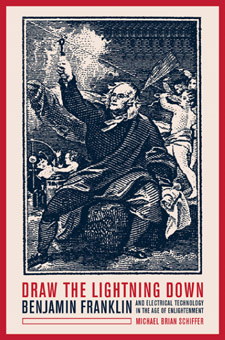 | Title: Draw the lightning down: Benjamin Franklin and electrical technology in the Age of Enlightenment Author: Schiffer, Michael B Published: University of California Press, 2003 Subjects: History | Urban Studies | History of Science | Anthropology | American Studies | European History Publisher's Description: Most of us know - at least we've heard - that Benjamin Franklin conducted some kind of electrical experiment with a kite. What few of us realize - and what this book makes powerfully clear - is that Franklin played a major role in laying the foundations of modern electrical science and technology. This fast-paced book, rich with historical details and anecdotes, brings to life Franklin, the large international network of scientists and inventors in which he played a key role, and their amazing inventions. We learn what these early electrical devices - from lights and motors to musical and medical instruments - looked like, how they worked, and what their utilitarian and symbolic meanings were for those who invented and used them. Against the fascinating panorama of life in the eighteenth century, Michael Brian Schiffer tells the story of the very beginnings of our modern electrical world. The earliest electrical technologies were conceived in the laboratory apparatus of physicists; because of their surprising and diverse effects, however, these technologies rapidly made their way into many other communities and activities. Schiffer conducts us from community to community, showing how these technologies worked as they were put to use in public lectures, revolutionary experiments in chemistry and biology, and medical therapy. This story brings to light the arcane and long-forgotten inventions that made way for many modern technologies - including lightning rods (Franklin's invention), cardiac stimulation, xerography, and the internal combustion engine - and richly conveys the complex relationships among science, technology, and culture. [brief] Similar Items |
| 452. | 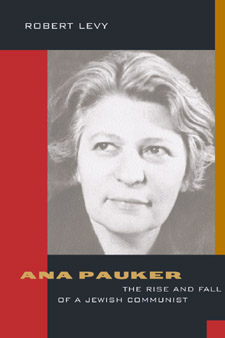 | Title: Ana Pauker: the rise and fall of a Jewish Communist Author: Levy, Robert 1957- Published: University of California Press, 2001 Subjects: History | Jewish Studies | Russian and Eastern European Studies | Politics | European History | Women's Studies Publisher's Description: In her own day, Ana Pauker was named "The Most Powerful Woman in the World" by Time magazine. Today, when she is remembered at all, she is thought of as the puppet of Soviet communism in Romania, blindly enforcing the most brutal and repressive Stalinist regime. Robert Levy's new biography changes the picture dramatically, revealing a woman of remarkable strength, dominated by conflict and contradiction far more than by dogmatism. Telling the story of Pauker's youth in an increasingly anti-Semitic environment, her commitment to a revolutionary career, and her rise in the Romanian Communist movement, Levy makes no attempt to whitewash Pauker's life and actions, but rather explores every contour of the complicated persona he found expressed in masses of newly accessible archival documents. [brief] Similar Items |
| 453. | 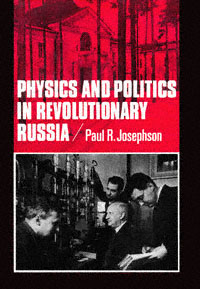 | Title: Physics and politics in revolutionary Russia Author: Josephson, Paul R Published: University of California Press, 1991 Subjects: History | History and Philosophy of Science | Russian and Eastern European Studies | Politics Publisher's Description: Aided by personal documents and institutional archives that were closed for decades, this book recounts the development of physics - or, more aptly, science under stress - in Soviet Russia up to World War II. Focusing on Leningrad, center of Soviet physics until the late 1930s, Josephson discusses the impact of scientific, cultural, and political revolution on physicists' research and professional aspirations.Political and social revolution in Russia threatened to confound the scientific revolution. Physicists eager to investigate new concepts of space, energy, light, and motion were forced to accommodate dialectical materialism and subordinate their interests to those of the state. They ultimately faced Stalinist purges and the shift of physics leadership to Moscow. This account of scientists cut off from their Western colleagues reveals a little-known part of the history of modern physics. [brief] Similar Items |
| 454. | 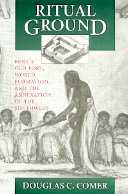 | Title: Ritual ground: Bent's Old Fort, world formation, and the annexation of the Southwest Author: Comer, Douglas C Published: University of California Press, 1996 Subjects: History | Californian and Western History | Cultural Anthropology | California and the West | United States History Publisher's Description: From about 1830 to 1849, Bent's Old Fort, located in present-day Colorado on the Mountain Branch of the Santa Fe Trail, was the largest trading post in the Southwest and the mountain-plains region. Although the raw enterprise and improvisation that characterized the American westward movement seem to have little to do with ritual, Douglas Comer argues that the fort grew and prospered because of ritual and that ritual shaped the subsequent history of the region to an astonishing extent.At Bent's Old Fort, rituals of trade, feasting, gaming, marriage, secret societies, and war, as well as the "calcified ritual" provided by the fort itself, brought together and restructured Anglo, Hispanic, and American Indian cultures. Comer sheds new light on this heretofore poorly understood period in American history, building at the same time a powerfully convincing case to demonstrate that the human world is made through ritual.Comer gives his narrative an anthropological and philosophical framework; the events at Bent's Old Fort provide a compelling example not only of "world formation" but of a world's tragic collapse, culminating in the Sand Creek massacre. He also calls attention to the reconstructed Bent's Old Fort on the site of the original. Here visitors reenact history, staff work out personal identities, and groups lobby for special versions of history by ritual recasting of the past as the present. [brief] Similar Items |
| 455. | 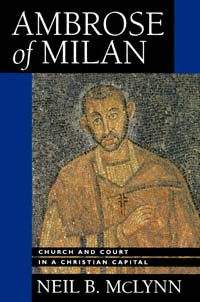 | Title: Ambrose of Milan: church and court in a Christian capital Author: McLynn, Neil 1960- Published: University of California Press, 1994 Subjects: Classics | History | Classical Religions | Christianity | Ancient History | Autobiographies and Biographies Publisher's Description: In this new and illuminating interpretation of Ambrose, bishop of Milan from 374 to 397, Neil McLynn thoroughly sifts the evidence surrounding this very difficult personality. The result is a richly detailed interpretation of Ambrose's actions and writings that penetrates the bishop's painstaking presentation of self. McLynn succeeds in revealing Ambrose's manipulation of events without making him too Machiavellian. Having synthesized the vast complex of scholarship available on the late fourth century, McLynn also presents an impressive study of the politics and history of the Christian church and the Roman Empire in that period.Admirably and logically organized, the book traces the chronology of Ambrose's public activity and reconstructs important events in the fourth century. McLynn's zesty, lucid prose gives the reader a clear understanding of the complexities of Ambrose's life and career and of late Roman government. [brief] Similar Items |
| 456. |  | Title: Good with their hands: boxers, bluesmen, and other characters from the Rust Belt Author: Rotella, Carlo 1964- Published: University of California Press, 2002 Subjects: History | American Studies | Sociology | Literature | Labor Studies | Urban Studies | Ethnic Studies | Gender Studies Publisher's Description: This eloquent, streetwise book is a paean to America's Rust Belt and a compelling exploration of four milieus caught up in a great transformation of city life. With loving attention to detail and a fine sense of historical context, Carlo Rotella explores women's boxing in Erie, Pennsylvania; Buddy Guy and the blues scene in Chicago; police work and crime stories in New York City, especially as they converged in the making of the movie The French Connection; and attempts at urban renewal in the classic mill city of Brockton, Massachusetts. Navigating through accrued layers of cultural, economic, and personal history, Rotella shows how stories of city life can be found in a boxing match, a guitar solo, a chase scene in a movie, or a landscape. The stories he tells dramatize the coming of the postindustrial era in places once defined by their factories, a sweeping set of changes that has remade the form and meaning of American urbanism. A native of the Rust Belt whose own life resonates with these stories, Rotella has gone to the home turfs of his characters, hanging out in boxing gyms and blues clubs, riding along with cops and moviemakers, discussing the future of Brockton with a visionary artist and a pitbull-fancying janitor who both plan to save the city's soul. These people make culture with their hands, and hands become an expressive metaphor for Rotella as he traces the links between their individual talents and the urban scenes in which they flourish. His writing elegantly connects what happens on the street to the larger story of urban transformation, especially the shift from a way of life that demanded individuals be "good with their hands" to one that depends on the intellectual and social skills fostered by formal education and service work. Strong feelings emerge in this book about what has been lost and gained in the long, slow aging-out of the industrial city. But Rotella's journey through the streets has its ultimate reward in discovering deep-rooted instances of what he calls "truth and beauty in the Rust Belt." [brief] Similar Items |
| 457. | 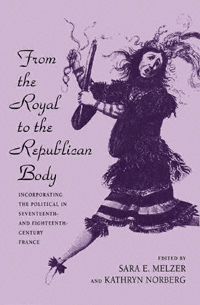 | Title: From the royal to the republican body: incorporating the political in seventeenth- and eighteenth-century France Author: Melzer, Sara E Published: University of California Press, 1998 Subjects: History | European History | French Studies | European Literature | Cinema and Performance Arts | Politics Publisher's Description: In this innovative volume, leading scholars examine the role of the body as a primary site of political signification in seventeenth- and eighteenth-century France. Some essays focus on the sacralization of the king's body through a gendered textual and visual rhetoric. Others show how the monarchy mastered subjects' minds by disciplining the body through dance, music, drama, art, and social rituals. The last essays in the volume focus on the unmaking of the king's body and the substitution of a new, republican body. Throughout, the authors explore how race and gender shaped the body politic under the Bourbons and during the Revolution. This compelling study expands our conception of state power and demonstrates that seemingly apolitical activities like the performing arts, dress and ritual, contribute to the state's hegemony. From the Royal to the Republican Body will be an essential resource for students and scholars of history, literature, music, dance and performance studies, gender studies, art history, and political theory. [brief] Similar Items |
| 458. | 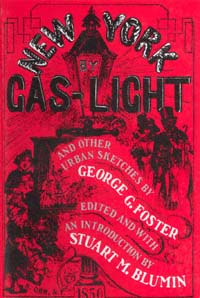 | Title: New York by gas-light and other urban sketches Author: Foster, George G d. 1856 Published: University of California Press, 1990 Subjects: History | United States History | Print Media | Urban Studies | Technology and Society Publisher's Description: First published in 1850, New York by Gas-Light explores the seamy side of the newly emerging metropolis: "the festivities of prostitution, the orgies of pauperism, the haunts of theft and murder, the scenes of drunkenness and beastly debauch, and all the sad realities that go to make up the lower stratum - the underground story - of life in New York!" The author of this lively and fascinating little book, which both attracted and offended large numbers of readers in Victorian America, was George G. Foster, reporter for Horace Greeley's influential New York Tribune, social commentator, poet, and man about town. Foster drew on his daily and nightly rambles through the city's streets and among the characters of the urban demi-monde to produce a sensationalized but extraordinarily revealing portrait of New York at the moment it was emerging as a major metropolis. Reprinted here with sketches from two of Foster's other books, New York by Gas-Light will be welcomed by students of urban social history, popular culture, literature, and journalism.Editor Stuart M. Blumin has provided a penetrating introductory essay that sets Foster's life and work in the contexts of the growing city, the development of the mass-distribution publishing industry, the evolving literary genre of urban sensationalism, and the wider culture of Victorian America. This is an important reintroduction to a significant but neglected work, a prologue to the urban realism that would flourish later in the fiction of Stephen Crane, the painting of George Bellows, and the journalism of Jacob Riis. [brief] Similar Items |
| 459. |  | Title: Loss: the politics of mourning Author: Eng, David L 1967- Published: University of California Press, 2002 Subjects: Literature | American Studies | History | Philosophy | Ethnic Studies | Gender Studies | Cultural Anthropology | Immigration Publisher's Description: Taking stock of a century of pervasive loss - of warfare, disease, and political strife - this eloquent book opens a new view on both the past and the future by considering "what is lost" in terms of "what remains." Such a perspective, these essays suggest, engages and reanimates history. Plumbing the cultural and political implications of loss, the authors--political theorists, film and literary critics, museum curators, feminists, psychoanalysts, and AIDS activists--expose the humane and productive possibilities in the workings of witness, memory, and melancholy. Among the sites of loss the authors revisit are slavery, apartheid, genocide, war, diaspora, migration, suicide, and disease. Their subjects range from the Irish Famine and the Ottoman slaughter of Armenians to the aftermath of the Vietnam War and apartheid in South Africa, problems of partial immigration and assimilation, AIDS, and the re-envisioning of leftist movements. In particular, Loss reveals how melancholia can lend meaning and force to notions of activism, ethics, and identity. [brief] Similar Items |
| 460. | 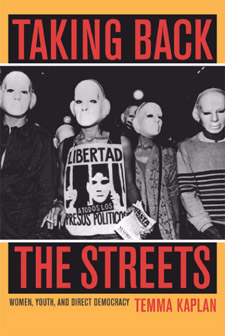 | Title: Taking back the streets: women, youth, and direct democracy Author: Kaplan, Temma 1942- Published: University of California Press, 2004 Subjects: History | Politics | Anthropology | Latin American Studies | European Studies | Women's Studies | Sociology Publisher's Description: Toward the end of the twentieth century in places ranging from Latin America and the Caribbean to Europe, the United States, South Africa, Nigeria, Iran, Japan, China, and South Asia, women and young people took to the streets to fight injustices they believed they could not confront in any other way. In the hope of changing the way politics is done, they called officials to account for atrocities they had committed and unjust laws they had upheld. They attempted to drive authoritarian governments from power by publicizing the activities these officials tried to hide. This powerful book takes us into the midst of these movements to give us a close-up look at how a new generation bore witness to human rights violations, resisted the efforts of regimes to shame and silence young idealists, and created a vibrant public life that remains a vital part of ongoing struggles for democracy and justice today. Through personal interviews, newspaper accounts, family letters, and research in the archives of human rights groups, this book portrays women and young people from Argentina, Chile, and Spain as emblematic of others around the world in their public appeals for direct democracy. An activist herself, author Temma Kaplan gives readers a deep and immediate sense of the sacrifices and accomplishments, the suffering and the power of these uncommon common people. By showing that mobilizations, sometimes accompanied by shaming rituals, were more than episodic - more than ways for societies to protect themselves against government abuses and even state terrorism - her book envisions a creative political sphere, a fifth estate in which ordinary citizens can reorient the political practices of democracy in our time. [brief] Similar Items |